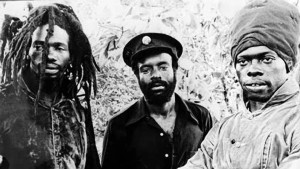 The Abyssinians is a Jamaican reggae group which was formed in 1968. The original members include Bernard Collins, Donald Manning and Lynford Manning. Other members include, Carlton Manning who replaced Bernard Collins at the end of 1978 and David Morrison.
The Abyssinians is a Jamaican reggae group which was formed in 1968. The original members include Bernard Collins, Donald Manning and Lynford Manning. Other members include, Carlton Manning who replaced Bernard Collins at the end of 1978 and David Morrison.
Carlton Manning who was the brother of Lynford and Donald, played the role of mentor for the group since its formation in 1968. He taught Donald to play the guitar and helped the group with their harmonies.
Satta Massagana
“Seteyimisgana yigebal huligezea igziabiher .” – “Jah is worthy to be praised continually.”
In March 1969 at the dawn of the relatively new reggae genre, the Abyssinians recorded one of their most famous songs “Satta Massagana” at Studio One. However it was never released by Coxsone Dodd. Dodd thought that the revolutinary rastafarian theme in the song would not appeal to the Jamaican audience.
In 1971 they purchased the original “Satta” recording from Studio One. It was later released on their own Clinch record label. It has since become a traditional hymn used by Rastafarians during worship and has also become an anthem of reggae music.
The legendary “Satta” Studio One recording session included Leroy Sibbles of Heptones on bass, Fil Callendar on drums, Eric Frater on guitar, Robbie Lyn on keyboards, Vin Gordon on trombone and Felix “Deadley Headley” Bennett on saxophone.
Later In 1971, producer Joe Gibbs made three instrumental recordings of “Satta Massagana”. The instrumental versions by Joe Gibbs was the first to receive airplay on Jamaican radio, as the original Satta Massagana was only played in the dance hall by the sound systems.
The original Satta recordings was remixed and performed by several artistes. Bernard Collins has credited “Satta” as the root of modern dancehall and dub music.
Satta Massagana and the Satta dubs dominated the airwaves and the dance hall throughout the 1970’s and had become the anthem for the revolutionary Rastafarian movement.
Debut Album
In 1976 they released their first album Satta Massagana. The album was also reissued in 1977 under the name Forward On To Zion.
Some of the most popular songs on the debut album included songs that were recorded in the early 1970’s such as “Declaration of Rights”, “Good Lord”, “Abendigo” “Y Mas Gan”, Forward On To Zion and Satta Massagana”.
“Declaration of Rights” is said to be one of Bob Marley’s favourite songs. The influence is especially noted on The Wailers “Get Up Stand Up” (1973).
Separation
In 1978, they recorded their second album Arise. After the album was released Bernard Collins left the group. He was replaced by Carlton Manning who was the brother of Donald and Lynford and also the lead singer for the group Carlton and the Shoes. The group was also joined by David Morrison. The new group made their last major performance in Jamaica at the 1979 Reggae Sunsplash.
The group separated in 1980. In the early 1980’s Donald Manning launched a brief solo career as Donald Abyssinian. The group of Donald Manning, Carlton Manning and David Morrison continued to perform at international shows throughout the early 1980’s.
Reunited
In 1989 the original group of Bernard, Donald and Lynford reunited briefly to record several singles over a three year period which ended in 1992. In 1995 a limited edition of the album was released. The offical release of the album called Reunion was done in 1998. The original group also performed at major festivals such as Reggae Sunsplash in 1989 and 1992.
In 2004 Bernard Collins, Donald Manning and David Morrison toured across Europe and the United States
In January 2016, the group will perform in St Ann Jamaica, at Rebel Salute reggae festival which is one of the most improtant reggae festivals on the Jamaican events calendar.
 Albums
Albums
Satta Massagana (1976)
Arise (1978)
Reunion (1998)
Members
Bernard Collins (original)
Donald Manning (original)
Lynford Manning (original)
Carlton Manning
David Morrison
also read The Abyssinians bio


